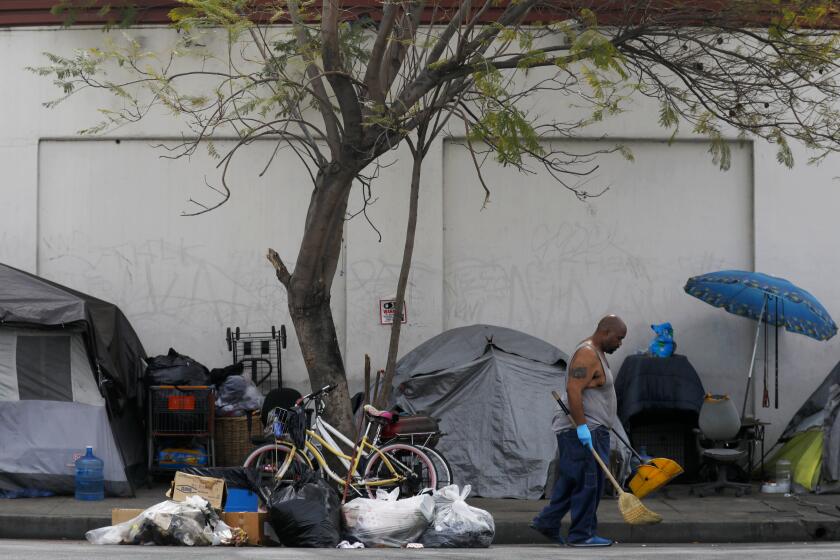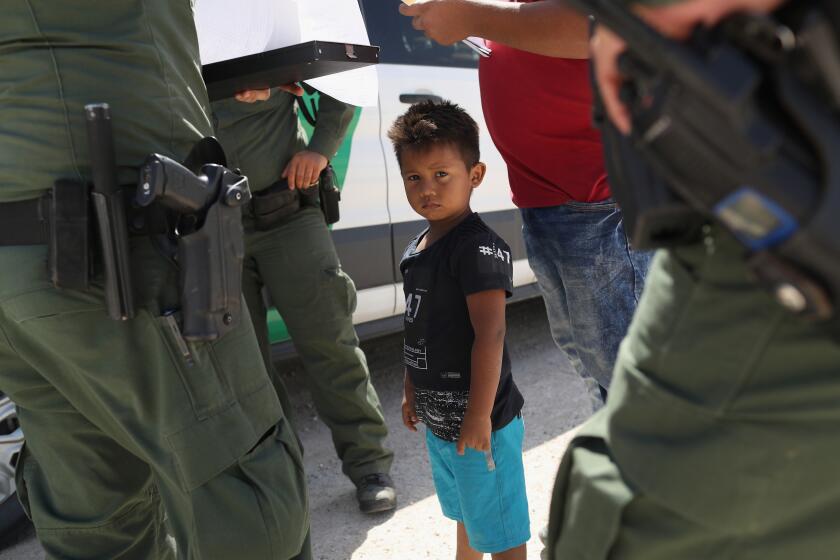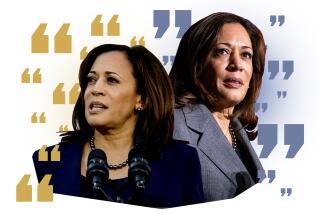Where do Democratic debate candidates stand on gun control?
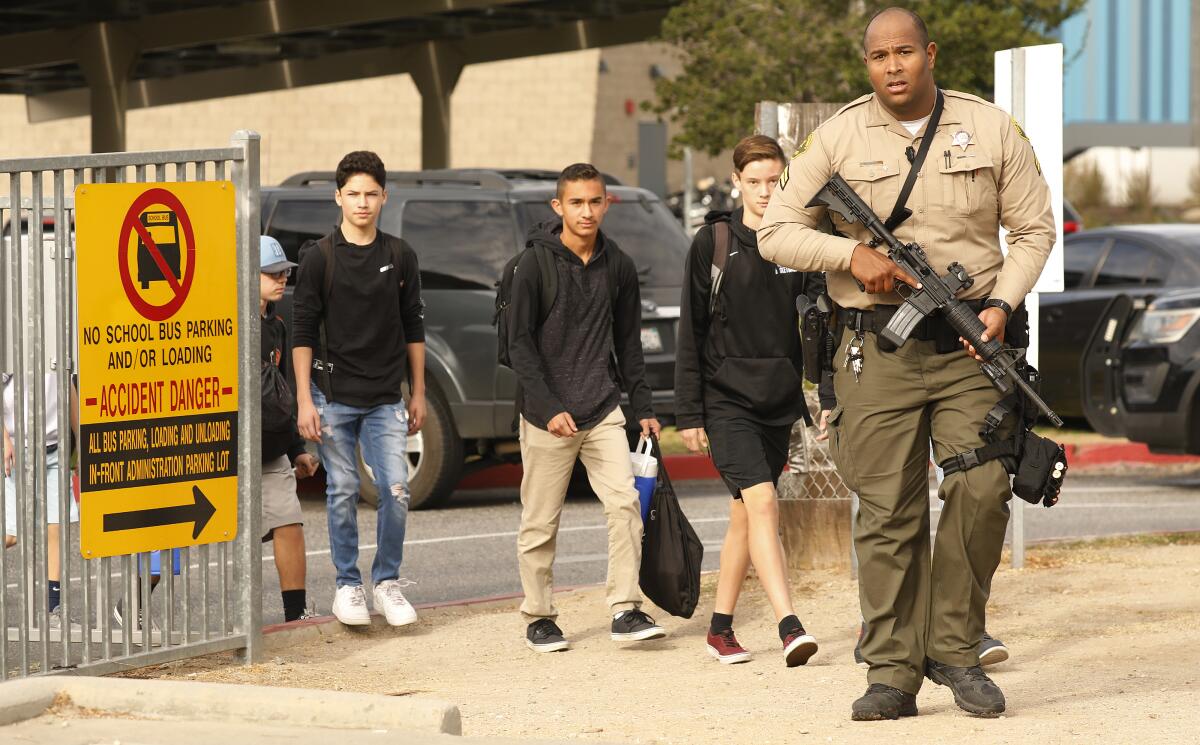
- Share via
The 2020 Democratic presidential candidates agree on big gun control policies, including banning the sale of semiautomatic rifles such as the AR-15.
After deadly mass shootings and a mounting suicide toll, they’ve called out the president and the powerful National Rifle Assn., the gun rights group that spent more than $30 million to help put Donald Trump in the White House.
And all seven candidates who qualified for the primary debate on Thursday support “red flag” laws, which enable people to get a court order removing guns from those judged to be a risk to themselves or others.
It’s in the details that differences emerge. Should the U.S. establish a gun buyback system? How far should it go?
Here’s a look at where the candidates who qualified for the debate scheduled for Thursday in L.A. stand on gun laws:
~~~
Joe Biden, former vice president
‘I know what it takes to beat the NRA, because I’ve done it twice before.’
— Joe Biden
In the Senate, where Joe Biden served from 1973 to 2009, he helped lay the foundation for the current background-check system and was one of the main supporters of the 1994 assault weapons ban, which lasted for a decade.
Biden had hoped to revive the ban, along with other gun control policies, when he was vice president in the Obama administration, but he was stymied by pushback from Republicans and the NRA. He’s now hoping to give the ban another go as president and require existing owners to register those guns with the government or sell them in a federal buyback program.
~~~
Pete Buttigieg, mayor of South Bend, Ind.
‘We cannot wait for purity tests. We have to just get something done.’
— Pete Buttigieg
As mayor of South Bend, Ind., Buttigieg has presided over a Rust Belt community that has been racked by gun violence, and his calls for an assault weapons ban, universal background checks and gun licensing come with a proposal for “urban gun violence intervention programs” that would address root causes of violence.
Buttigieg has also called for banning people convicted of hate crimes from buying or owning guns. But he has also pointedly warned that confiscations of assault weapons might bring a political backlash that could imperil the chance for more moderate changes.
~~~
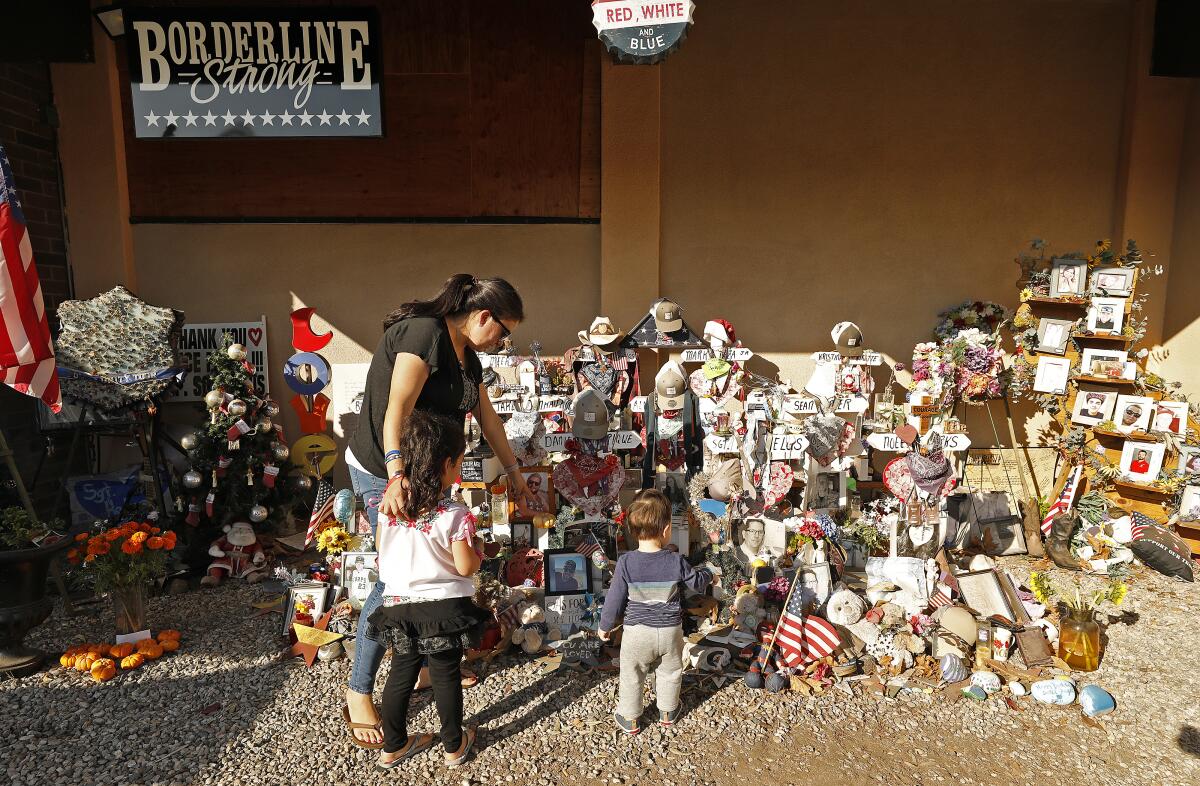
~~~
Amy Klobuchar, senator from Minnesota
‘I come from a state that has a proud tradition of hunting and fishing, so I look at all these proposals and I say, “Does this hurt my Uncle Dick in his deer stand?” And when I look at things like universal background checks, they don’t do that.’
— Amy Klobuchar
Minnesota Sen. Amy Klobuchar, a Midwestern moderate who has pitched herself as a candidate best positioned to reach Trump voters, is nonetheless in step with the rest of the Democratic field when it comes to guns.
She would ban assault weapons, require universal background checks and pursue “red flag” laws allowing authorities to take guns away from high-risk gun owners.
But she also positions herself as a defender of hunters, often asking of policies, “Would this hurt my Uncle Dick in the deer stand?”
~~~
Bernie Sanders, senator from Vermont
‘I do not think it is unreasonable to say that you should be able to go to the store without the fear of being gunned down. We can and we will end the epidemic of gun violence in this country.’
— Bernie Sanders
Vermont Sen. Bernie Sanders has taken somewhat moderate positions on gun control in the past — voting against a federal background-check system in 1993 and at one point earning a “C-“ grade from the NRA, which is more prone to giving Democrats failing grades — but no longer.
The 2020 version of Sanders has unequivocally called for a ban on assault weapons sales and to treat the ownership of existing weapons as the government treats that of fully automatic weapons, which are heavily restricted.
~~~
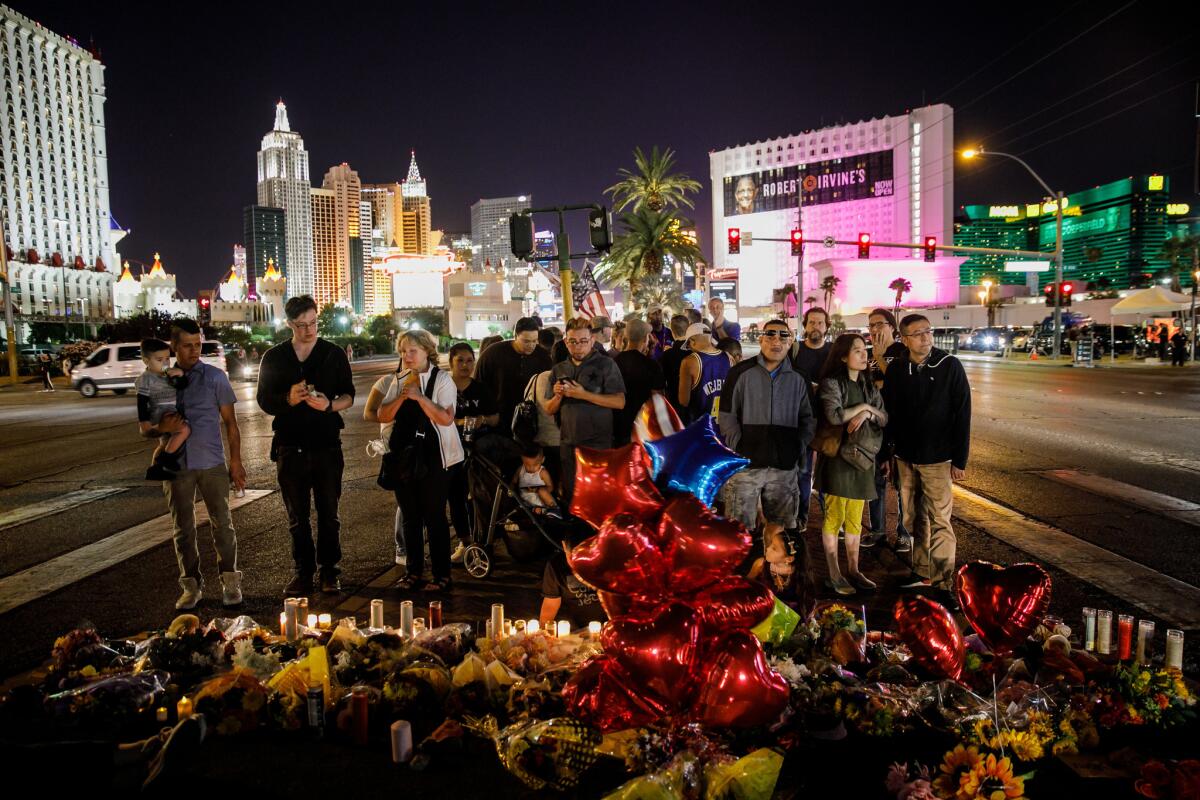
~~~
Tom Steyer, philanthropist
‘The gun debate isn’t a conversation about the 2nd Amendment. It is a conversation about corruption and cowardice. Members of Congress should be held accountable to the people — not special interests and gun manufacturers.’
— Tom Steyer
Billionaire Tom Steyer has previously used his self-funded activist nonprofit NextGen America to help register high school students to vote after the Feb. 14, 2018, massacre at Marjory Stoneman Douglas High School in Parkland, Fla.
Steyer has framed his campaign around building grass-roots power for voters, and he has linked his main gun control policies — an assault weapons ban and universal gun licensing and background checks — to what he sees as structural challenges to the NRA’s lobbying power: campaign finance reform, expanded voter registration and a bolstered Internal Revenue Service to scrutinize industry-backed nonprofits such as the NRA.
~~~
Elizabeth Warren, senator from Massachusetts
‘The NRA is a corrupt group of well-financed extremists who have made it perfectly clear that they will never put the safety of the American people first. We must hold them accountable.’
— Elizabeth Warren
Massachusetts Sen. Elizabeth Warren has linked her plans for gun restrictions — including mandatory licensing, universal background checks and an assault weapons ban — with a call to end the filibuster, which she sees as potentially dooming any such legislation in the Senate.
She has also proposed taking extensive administrative action that would allow to her to avoid Congress, where Republicans hope to maintain a majority in the Senate.
Her administration, she says, would take a close look at the NRA.
“The NRA is accused of exploiting loopholes in federal laws governing nonprofit spending to divert member dues into lavish payments for its board members and senior leadership,” she said in a blog post revealing some of her gun control proposals. “I’ll appoint an attorney general committed to investigating these types of corrupt business practices, and the banks and third-party vendors — like Wells Fargo — that enabled the NRA to skirt the rules for so long.”
~~~
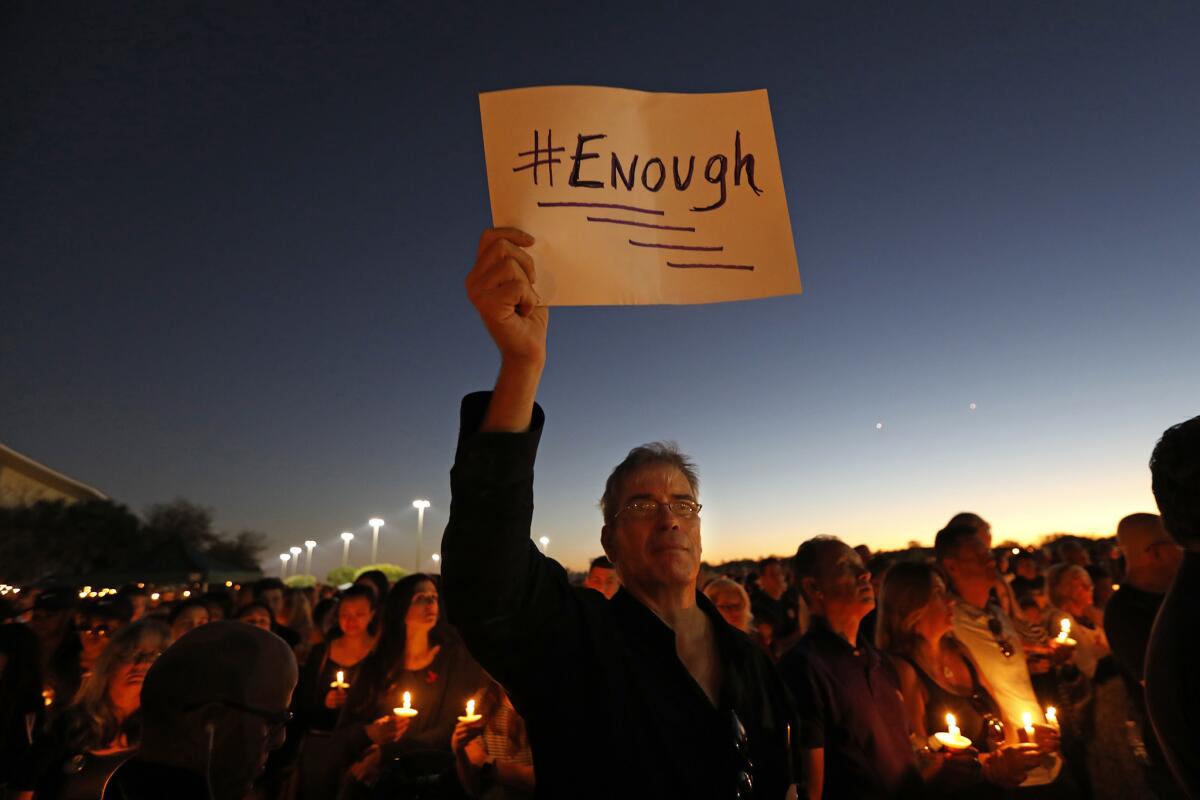
~~~
Andrew Yang, businessman
‘We owe it to the next generation to rise to the challenge of school shootings via both improved mental health and gun safety.’
— Andrew Yang
Yang, an outsider candidate who has had some of the most unorthodox ideas in the Democratic primary, is in line with the rest of the field in calling for an assault weapons ban, mandatory licensing and background checks, and creating a federal buyback program.
His more unusual ideas, however, include requiring gun owners to present a receipt for a gun locker or a trigger lock as a condition of obtaining a gun license, and he wants to “initiate and fund mindfulness programs in schools and correctional facilities” to reduce violence.
Where the Democratic candidates stand ...
More to Read
Get the L.A. Times Politics newsletter
Deeply reported insights into legislation, politics and policy from Sacramento, Washington and beyond. In your inbox twice per week.
You may occasionally receive promotional content from the Los Angeles Times.
